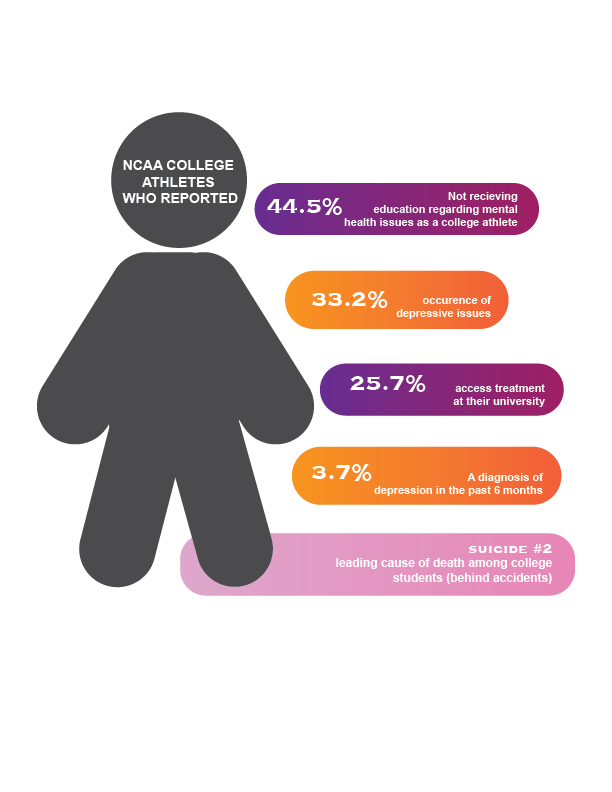Mental Health: ‘A part of being a complete student-athlete’
September 17, 2019
Student-athletes in college have trainers and coaches around to keep them in top physical condition. If they get injured, doctors are in place to help get them back on the field in peak physical shape. But who can help student-athletes with their mental health? Mental health is an important area that can be overlooked when coaches and trainers push the student-athletes to be invincible physically.
“I am not sure it is so much negative, as much as it is a perception. In our SAAC (student-athlete advisory committee) meeting last week, we talked about if we give [mental health counseling] a different name, does it give it another connotation?” Associate Athletic Director Debbie Kirch, who oversees compliance and student services, said.
Kirch feels physical health is treated differently compared to mental health.
“If you are injured physically, a doctor tells you, you have to sit out, rest, or have surgery. There is a diagnosis. When you are struggling mentally and emotionally there is that question mark of ‘is it bad enough yet?’ It is not as clear cut as something physical,” Kirch said.
Participation in sports can help student-athletes develop and maintain good mental wellness. However, the culture of sports can sometimes promote a stigma around mental illness. This is one reason why many student athletes do not seek help because they may fear being labeled as weak.
Beyond the inferior feeling that student-athletes may feel when dealing with mental illness, such as depression and anxiety, the inability to recognize symptoms is just as much to blame.
“I think the biggest thing is just noticing changes; it is hard to say what those changes are because it depends on the person. Maybe somebody is really outgoing, and they stop being outgoing and they are more closed off,” Kirch said. “Maybe someone is not really outgoing and now they become outgoing. It is just noticing differences and changes, little things, that something is not right. We have to be more perceptive of those changes.”
Students, especially teammates, should be educated on the signs to recognize when one of their teammates is beginning to have issues with mental health. Alec Sandusky, senior cross country runner for the Norse, shared with the student-athlete body his story about going to seek help during the welcome back at the beginning of the 2019-20 school year.
“I think just sharing my personal story about how I got help and how easy it is would be a great start. When someone sees that someone else has done it, they are more willing to give it a try,” Sandusky said.
Changing the image around mental health begins at the top of the athletic department. When the athletic department emphasizes a focus on mental health, it then trickles down into the coach’s hands. This, in turn, leads to athletes who are more receptive to the message. Thus, many more are likely to go and seek help at the university’s resources.
“The biggest difference with student-athletes are the extra pressure, time commitments and how hard we are on ourselves is what I would say is unique. We feel pressure from coaches, parents and ourselves to perform at the highest level possible and that can weigh on your mind. We just need to remember we belong here and can handle that pressure,” Sandusky said.
Other universities have recognized this issue as well. Some have even launched initiatives. On Sept. 9, Boise State University launched #BroncoBOLD, an initiative to showcase the athletic department’s mental health programming for student-athletes, coaches and staff. Bronco student-athletes will wear helmet stickers, hair ribbons and patches throughout this weekend’s competitions in support of the #BroncoBOLD initiative.
Recognition is the start of the solution to many issues including, and especially, mental health.
“Student-athletes are raised to be strong and to perform. The stigma of being mentally weak to their coaches, teammates, parents… is a huge obstacle for some.”
‘We are working with our [student athletes] to understand that getting help/counseling is just like eating nutritious food, getting enough sleep, staying hydrated, using the strength and conditioning department … It’s just a part of being a complete student-athlete,” Molly Woods, the associate athletic director of Sports Medicine and Risk Management, said.
Everyone in the athletics department is supportive of bringing mental health support to the forefront, from Woods to the director of athletics.
“Ken Bothof is in complete support of using and encouraging mental health services,” Woods said. “He sees this as a tool to help our student-athletes be highly effective at the Division I level.”
The connections between departments at NKU are growing, and the true benefactors are the students and student-athletes. The Norse have recently partnered with Dr. Christopher Lawrence, the director of the Clinical Mental Health Counseling Program. Woods said that the hope is to develop new programs with the graduate students for our student-athletes.
Suicide prevention resources
If you or someone you know is having thoughts of suicide, there are resources available near you:
National Suicide Prevention Lifeline: 1-800-273-TALK (8255)
Crisis Textline: Text CONNECT to 741741
Health Counseling and Student Wellness Crisis Line: (859) 572-7777
University Police: Call 911 or (859) 572-7777
National Alliance on Mental Illness Kentucky Crisis Line: (800) 950-NAMI (6264)
To schedule a counseling appointment at Health, Counseling and Student Wellness: (859) 572-5650

